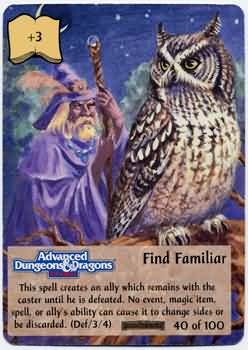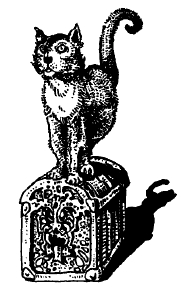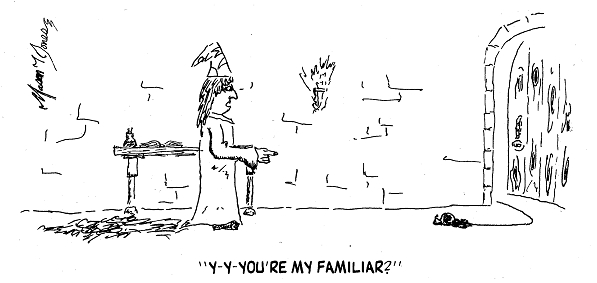Find Familiar
(Conjuration/Summoning)

Find Familiar
(Conjuration/Summoning)

|
|
|
|
|
|
|
|
|
|
|
|
|
|
|
|
|
|
|
|
|
|
|
|
Effect: A familiar
is of certain benefit to a MU, as the creature
adds to the spell caster's HP, it conveys its sensory powers to its master,
and it can converse with
and will serve as a guard/scout/spy as well.
ADQ: Can good clerics
have familiars?
If so, where and how?
ADA: Clerics do NOT
get familiars, but
one may be "loaned" to a
cleric for
exceptional service. The
type of familiar
so "loaned" is determined
as for M-Us.
("Special" results also
apply.)
(Polyhedron #17)
ADQ: Do normal familiars
detect as magick?
Can they be Dispelled?
ADA: No. Even though
a spell was used to find
the familiar, it is not
considered magickal itself.
Normal familiars do not
detect as magick, nor can
a Detect Magick send
one away. <reveal a familiar for what it is.>
(Polyhedron #19)
Find familiar: PCs
should be aware that
the summoned familiar cannot
be replaced
by another while it still
lives (even
if sent away by the wizard)
and that
killing one's own familiar
can have even
worse consequences than
the permanent
HP loss mentioned in the
PH.
(Imagine #29)

However, the magic-user has
no control over
what sort of creature will
answer the summoning, or if any at all will come,
and the power of the conjuration
is such that it can be attempted but once
per year. At such time as
the magic-user determines to find a familiar, he
or she must stoke up a brass
brazier with charcoal, and when this is
burning well, add 100 g.p.
worth of incense, herbs (basil, savory,
and
catnip for sure), and fat.
When these items are burning, the spell caster
begins his or her incantation,
and it must be continued until the familiar
comes or the casting time
is finished. Your referee will secretly determine
all results. The magic-user
has absolutely no control over what sort of a
creature appears to become
his or her familiar. This will be determined on
the table below:
| Die Roll (d20) | Familiar | Sensory Powers |
| 1-4 | cat, black | excellent night vision & superior hearing |
| 5-6 | crow | excellent vision |
| 9-10 | owl, screech | night vision equals human daylight visual ability, superior hearing |
| 11-12 | toad | wide angle vision |
| 13-14 | weasel | superior hearing & very superior olfactory power |
| 15 | special | see sub-table below for details |
| 16-20 | no familiar available within spell range | - |
* Subtract
1 from the die score for each 3 levels of experience
of the
spell caster, and if the score is 15 or less roll again
using
d16, and if a 16 is rolled then the result is final.
[note: OSRIC, page 78, gives an alternate table]
If a score of 15 is rolled,
use the table below for a special familiar:
| Alignment of Magic-User | Result of Special Familiar |
| chaotic evil or neutral chaotic | quasit
|
| chaotic good, neutral, or neutral good | pseudo-dragon
|
| lawful neutral or lawful good | brownie |
| lawful evil or neutral evil | imp
|
Normal familiars have 2-4
hit points and armor class of 7 (due to size, speed, etc.).
Each
is abnormally intelligent and totally faithful
to the magic-user whose familiar it becomes.
The number of the familiar's
hit points is added to the hit point total of the magic-user when it is
within 12" of its master,
but if the familiar should
ever be killed, the magic-user will permanently lose double that number
of hit points.
If a special familiar is
indicated, details of the powers it conveys are given in AD&D,
MM for all except the brownie. This creature becomes a friend and companion
to the magic-user, and he or she will gain dexterity equal to the brownie's
(18) and the advantage of never being surprised, as well as +2 on all saving
throws.
A familiar will fight for
the life of the magic-user it serves only in a life and-death situation,
and imps and quasits will
be 90% likely not to do so at the risk of their own life.
Saving Throw: Note that special familiars are entitled to a saving throw versus magic when summoned by the spell, and if they succeed, they will ignore the spell, and NO familiar will be available that year to the caster.
DMG:
If the magic-user opts to send away a familiar,
he or she may never again
find another until the former is killed or dies.
Purposely killing or causing
to be killed a familiar (or former familiar) is most likely to find great
disfavor with the gods,
assuming, of course, that
this pertains to the magic-user and his or her associated familiar.
Note that spell duration
concerns the finding of the familiar.
Once it is found, the familiar
will serve until killed.
To determine animal availability,
see the fourth level druid spell, Animal Summoning I.
MC: At such time as
the magic-user determines to find a familiar, he
or she must stoke up a brass
brazier with charcoal, and when this is
burning well, add 100 g.p.
worth of incense, herbs (basil, savory, and
catnip for sure), and fat.
* * *
Question: It states
in the Monster Manual (under Quasit)
that
Clerics can have familiars.
How do Clerics go about obtaining
these familiars, and what
is available?
Answer: The description
under Quasit in the MM does not imply that all Clerics can have
familiars;
it merely says that the
Quasit is a particular creature which may serve as a
familiar for a Cleric of
chaotic evil alignment. The question of
whether or not any other
sort of Cleric can have a familiar, or
precisely which creatures
might be able to serve in this capa-
city, is left to the DM.
If a DM rules that Clerics may be entitled to
have familiars, it is suggested
that they only be granted by a
Cleric’s deity to a worshipper
who has remained faithful to that
deity for a long, long time,
and as reverently as possible has
fulfilled the requests and
requirements of that religion.
* * *
Q: If a magic-user has a familiar, how fast can the familiar travel astrally?
SA:
Find Familiar, Monster Summoning — Note that these spells
do
not open an inter-planar gate, but simply attract creatures
residing
on or passing through the Astral Plane.
ADQ:
Can a magic-user have more
than
one familiar at a time?
ADA:
Absolutely not. If the magic-user
already
owns one yet summons another
to
appear, the 2 familiars will kill
each
other to win the attention of the
magic-user.
(Polyhedron
#13)
ADQ:
May a ranger cast a Find Familiar
spell
and have a familiar in the
same
manner as a magic-user?
ADA:
The nature of the ranger sub-class
is
such that one would not want the aid
of
a familiar. Further, the powers conferred
upon
a magic-user from a familiar
would
not easily apply to the ranger.
On the other hand, the nature of the
subclass
makes it perfectly possible for
the
ranger to develop a highly trained
creature
of the forest to aid him/her in
much
the same way that a familiar
would
help a magic-user.
(Polyhedron
#13)
ADQ:
According to PH.66,
a
familiar "conveys its senssory
powers
to its master". Does this
mean
that the M-U himself is
endowed
with night vision, superior
hearing,
etc.? Or, does it mean rather
that
there is some kind of mental link
which
allows the mage to see through his
familiar's
eyes, hear with its ears, etc.?
ADA:
The M-U does NOT see
through
the familiar's eyes; this telepathic
effect
is gained only via a homunculus. A
familiar's
much looser connection does give
the
M-U additional powers, as given
in
the spell description.
(Polyhedron
#25)
ADQ:
How many familiars can a M-U
have
at one time?
ADA:
One only.
(Polyhedron
#25)
WSG: Any attempt to
cast this spell in a desolate area (a
scorching desert or arctic
wastes) may, at the discretion of the
Dungeon Master, automatically
fail to attract any of the listed
creatures. In any event,
the possibilities for normal familiars
should be restricted to
creatures that could conceivably exist
within the spell range;
a black cat almost certainly will not be
found in a desert or at
the summit of a mountain range, and a toad
probably will not be found
in the middle of a grassy plain miles
from any source of ground
water. Die-roll results that indicate
such a contradiction may
either be re-rolled or treated as “no familiar
available,” depending on
the judgment of the Dungeon
Master.

ScottyG wrote:
Gary, did any of you m-u
characters have familiars? I know they had charmed characters and monsters,
henchmen, armies, but what about a cat, or a toad?
Scott

Hi Scotty,
As a matter of fact none
of my m-us ever possessed a familiar.
I didn't think the potential
benefits outweighed the drawbacks.
Cheers,
Gary
Nikosandros wrote:
And as a follow up to this
one, if yes how did they manage to survive?

See above... ![]()
Cheers,
Gary

*template***template*